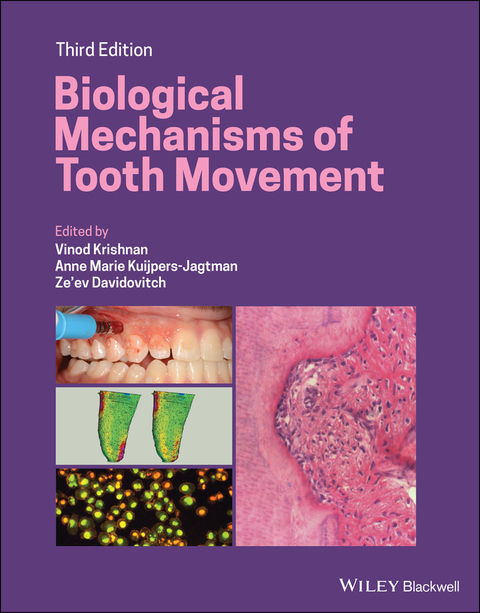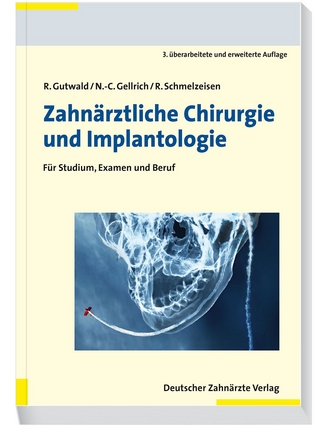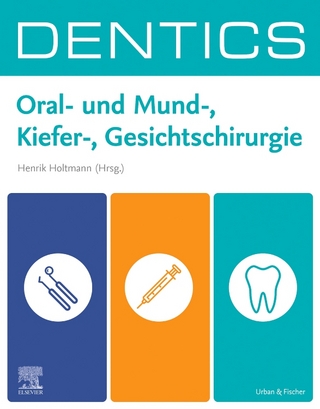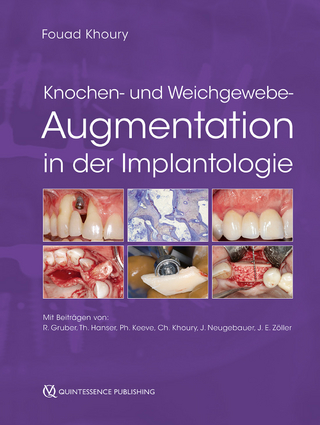
Biological Mechanisms of Tooth Movement
Wiley-Blackwell (Verlag)
978-1-119-60893-6 (ISBN)
The newly and thoroughly revised Third Edition of »Biological Mechanisms of Tooth Movement« delivers a comprehensive reference for orthodontic trainees and specialists.
It is fully updated to include new chapters on personalized orthodontics as well as the inflammatory process occurring in the dental and paradental tissues. It is heavily illustrated throughout, making it easier for readers to understand and retain the information discussed within. The topics covered range from bone biology, the effects of mechanical loading on tissues and cells, genetics, tissue remodeling, and the effects of diet, drugs, and systemic diseases.
The Third Edition of »Biological Mechanisms of Tooth Movement« features seven sections that cover subjects such as:
- The development of biological concepts in orthodontics, including the cellular and molecular biology behind orthodontic tooth movement
- Mechanics meets biology, including the effects of mechanical loading on hard and soft tissues and cells, and biological reactions to temporary anchorage devices
- Inflammation and orthodontics, including markers for tissue remodeling in the gingival crevicular fluid and saliva
- Personalized diagnosis and treatment based on genomic criteria, including the genetic influences on orthodontic tooth movement
- Rapid orthodontics, including methods to accelerate or decelerate orthodontic tooth movement
Perfect for residents and PhD students of orthodontic and periodontal programs, »Biological Mechanisms of Tooth Movement« is also useful to academics, clinicians, bone biologists, and researchers with an interest in the mechanics and biology of tooth movement.
Vinod Krishnan is Professor and Head of the Department of Orthodontics at the Sri Sankara Dental College in India.
Anne Marie Kuijpers-Jagtman is Researcher at the University Medical Center Groningen in The Netherlands as well as Adjunct Professor at the University of Bern in Switzerland and the University of Indonesia.
Ze'ev Davidovitch is Professor Emeritus of Orthodontics at Harvard University in the United States.
Contributors
Preface to the first edition
Preface to the second edition
Preface to the third edition
Part 1: Evolution of biological concepts
1. Biological basis of orthodontic tooth movement: an historical perspective
Vinod Krishnan and Ze'ev Davidovitch
2. Biology of orthodontic tooth movement: the evolution of hypotheses and concepts
Vinod Krishnan and Ze'ev Davidovitch
Part 2: Mechanics meets biology
3. Cellular and molecular biology of orthodontic tooth movement
Jaap C. Maltha, Vinod Krishnan, and Anne Marie Kuijpers-Jagtman
4. Inflammatory response in the periodontal ligament and dental pulp during orthodontic tooth movement
Masaru Yamaguchi and Gustavo Pompermaier Garlet
5. The effects of mechanical loading on hard and soft tissues and cells
Itzhak Binderman, Nasser Gadban, and Avinoam Yaffe
6. Biological aspects of bone growth and metabolism in orthodontics
James K. Hartsfield, Jr., Priyanka Gudsoorkar, Lorri A. Morford, and W. Eugene Roberts, Jr.
7. Mechanical load, sex hormones, and bone modeling
Sara H. Windahl and Ulf H. Lerner
8. Biological reactions to temporary anchorage devices
Gang Wu, Jiangyue Wang, Ding Bai, Jing Guo, Haikun Hu, and Vincent Everts
9. Tissue reaction to orthodontic force systems. Are we in control?
Birte Melsen, Michel Dalstra, and Paolo M. Cattaneo
Part 3: Inflammation and orthodontics
10. The influence of orthodontic treatment on oral microbiology
Alessandra Lucchese and Lars Bondemark
11. Markers of paradental tissue remodeling in the gingival crevicular fluid and saliva of orthodontic patients
Taylor E. Glovsky and Laura R. Iwasaki
Part 4: Personalized diagnosis and treatment
12. Genetic influences on orthodontic tooth movement
Margarita Zeichner-David
13. Precision orthodontics: limitations and possibilities in practice
James K. Hartsfield, Jr., Priyanka Gudsoorkar, and Lorri A. Morford
14. The effect of drugs, hormones, and diet on orthodontic tooth movement
Vinod Krishnan, James J. Zahrowski, and Ze'ev Davidovitch
Part 5: Rapid orthodontics
15. Biological orthodontics: methods to accelerate or decelerate orthodontic tooth movement
Vinod Krishnan, Ze'ev Davidovitch, and Anne Marie Kuijpers-Jagtman
16. Surgically assisted tooth movement: biological application
Carlalberta Verna, Raffaele Spena, Michel Dalstra, Paolo M. Cattaneo, and Judith V. Ball
17. Precision accelerated orthodontics: how micro-osteo-perforations and vibration trigger inflammation to optimize tooth movement
Mani Alikhani, Jeanne M. Nervina, and Christina C. Teixeira
Part 6: Long-term effects of tooth-moving forces
18. Mechanical and biological determinants of iatrogenic injuries in orthodontics
Vinod Krishnan, Ambili Renjithkumar, and Ze'ev Davidovitch
19. The biological background of relapse of orthodontic tooth movement
Jaap C. Maltha, Vaska Vandevska-Radunovic, and Anne Marie Kuijpers-Jagtman
Part 7: Tooth-movement research
20. Planning and executing tooth-movement research
Vinod Krishnan, Ze'ev Davidovitch, and Rajesh Ramachandran
21. Controversies and research directions in tooth-movement research
Vinod Krishnan, Anne Marie Kuijpers-Jagtman, and Ze'ev Davidovitch
Index
| Erscheinungsdatum | 04.06.2021 |
|---|---|
| Verlagsort | Hoboken |
| Sprache | englisch |
| Maße | 216 x 279 mm |
| Gewicht | 1248 g |
| Einbandart | gebunden |
| Themenwelt | Medizin / Pharmazie ► Allgemeines / Lexika |
| Medizin / Pharmazie ► Zahnmedizin ► Chirurgie | |
| Medizin / Pharmazie ► Zahnmedizin ► Klinik und Praxis | |
| Medizin / Pharmazie ► Zahnmedizin ► Kieferorthopädie | |
| Schlagworte | kieferorthopädische Zahnbewegung |
| ISBN-10 | 1-119-60893-7 / 1119608937 |
| ISBN-13 | 978-1-119-60893-6 / 9781119608936 |
| Zustand | Neuware |
| Informationen gemäß Produktsicherheitsverordnung (GPSR) | |
| Haben Sie eine Frage zum Produkt? |
aus dem Bereich


